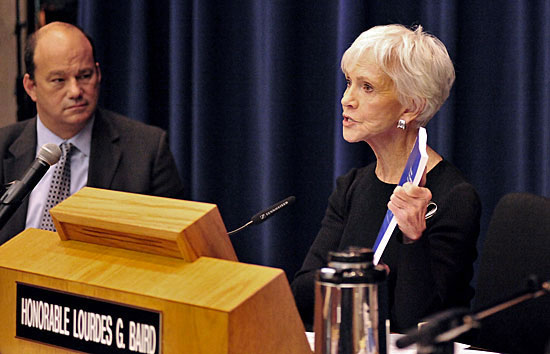A time to stay the course
September 19, 2013
After many years in office, I know how tempting it is for political bodies to jump into action when a problem is generating headlines or otherwise commanding public attention. But sometimes what sounds like a good idea may actually be counterproductive, falsely raising expectations at the precise moment when careful and dispassionate analysis should rule the day.
Such an issue surfaced this week at the Board of Supervisors, where my colleagues Mark Ridley-Thomas and Gloria Molina introduced a motion calling for the permanent creation of a Sheriff’s Department Oversight Commission, whose members would be appointed by the board.
They argued that ongoing investigations by the U.S. Justice Department and continuing allegations of brutality by deputies in the jails proved that a new level of civilian oversight was needed—one that a busy Board of Supervisors alone cannot provide. A vote is scheduled for October 8.
I certainly share the proponents’ desire to tighten the reins on the Sheriff’s Department, but let me tell you why I’ll be among the “no” votes.
As many of you may know, I’ve spent a good deal of my public life holding our region’s two biggest law enforcement agencies accountable for unconstitutional behavior, from the political spying and excessive force of the Los Angeles Police Department back in the 1980s to the escalating brutality inflicted on L.A. County jail inmates by sheriff’s deputies in more recent times. In fact, I championed the establishment of the Citizens Commission on Jail Violence, whose esteemed members last year proposed more than 60 reforms for the Sheriff’s Department’s jail operation.
The lynchpin of those widely-praised recommendations was the creation of an Office of Inspector General to provide rigorous, independent oversight of the department, reporting directly to the Board of Supervisors. We will soon review candidates to lead this essential watchdog agency.
The blue-ribbon panel—whose members included former federal judges, a big-city police chief and a prominent south Los Angeles pastor—specifically considered whether to recommend the creation of a permanent civilian commission, like the one now being proposed. The answer: no.
“The Commission believes that a fully empowered and integrated Office of Inspector General reporting to an engaged Board of Supervisors can provide the necessary independent oversight of the Department to ensure that it implements meaningful and lasting reforms,” the panelists wrote in their final report. The creation of another civilian commission, they said, “was not necessary.”
And should anyone question the Board of Supervisors’ level of engagement, Tuesday’s meeting alone should have offered an answer. Besides the proposal for a new oversight body, our day was packed with reports and debate on the status of the earlier jail commission’s recommendations, the decreasing number of serious use-of-force cases, and methods of coping with thousands of new inmates now serving sentences in the county lockup rather state prison because of sweeping changes to California law.
The strongest argument against a new oversight commission is simply that it would be powerless to force changes within the Sheriff’s Department. And, despite the suggestions of the measure’s backers, the Los Angeles Police Department does not provide us with a model for civilian governance.
The sheriff is publicly elected, making him directly accountable to voters every four years. Although the Board of Supervisors holds the purse strings, state law expressly gives the sheriff here and in counties across the state wide control over the operations of their departments. The LAPD chief, on the other hand, is politically-appointed and, under the city charter, reports directly to a five-member Board of Police Commissioners, which governs the department.
In their final report, the jail commission pointedly noted the difference between the two law enforcement agencies, saying that “a civilian jail commission would not have any legal authority over the Sheriff’s Department absent enabling [state] legislation.” The probability of getting such legislation is, at best, remote. In other words, the proposed commission would amount to little more than a soapbox for the panelists—and a disappointment for those of us committed to a top-to-bottom cultural change.
On Tuesday, my colleague, Don Knabe, called the proposal for a new commission “a bit premature.” I agree. The Citizens Commission on Jail Violence, staffed by some of L.A.’s brightest criminal justice minds, offered us a detailed roadmap to reform. That includes allowing an inspector general—whose authority Sheriff Lee Baca has said he will accept—to hold the department accountable through meaningful oversight.
We shouldn’t now be looking for shortcuts that, in the end, would divert us from our destination.
Posted 9/19/13













 405 bridge work causes a stink
405 bridge work causes a stink





